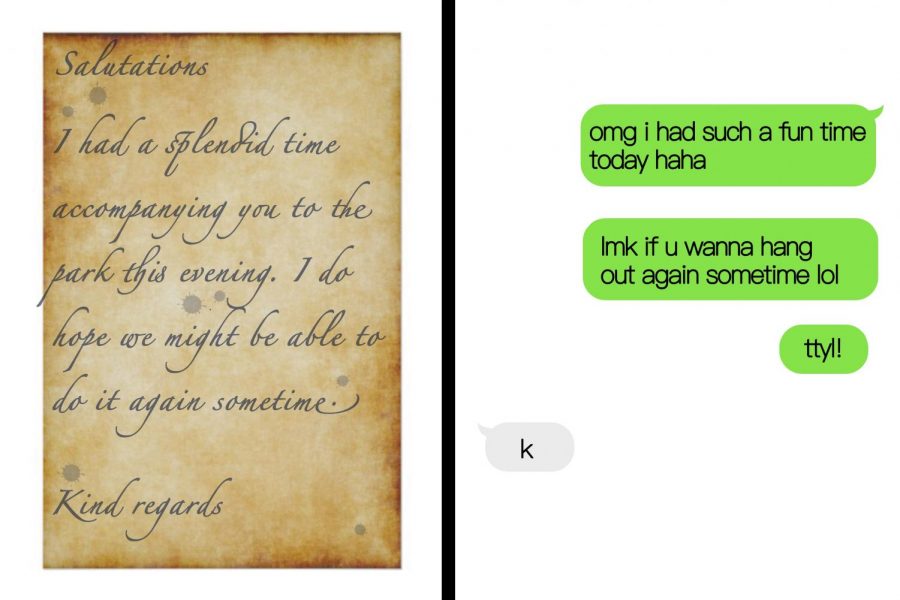Ansley’s Column: Is English a dying language?
The following is part of a monthly column written by Senior Writer Ansley Morris.
English compared to then and now. Art by Evanthia Stirou.
The English language is a beautiful thing. Or at least it was. Comparing my education experience from the early years (when we mostly learned from books and worksheets) to what’s now a much more tech-centered learning experience, it seems as though, among other things, the value placed on achieving mastery of our language is depreciating.
I believe the diminishing of our language skills (reading, writing, and speaking) ties directly into the effects of rapidly-developing technology on our attention spans.
Let’s face it— the smarter technology gets, the “less smart” we get (more on this later).
It’s a natural correlation: if a device or another person does the hard work of thinking for you, you’re simply not going to think as hard. As a generation, we’ve adapted to devices doing a good chunk of the work for us which is causing our learning skills to degrade.
In terms of language and literacy, tools such as auto-correct, Sparknotes, Google Translate, and Grammarly are definitely helpful at times, but in the bigger picture, they’re cheating us out of having to use and hone our brainpower and increase our knowledge and skills.
An article in The Atlantic called “Is Google Making Us Stupid?” thoroughly addresses the effects the internet is having on our brains. Nicholas Carr, the author of the article, said, “And what the Net seems to be doing is chipping away my capacity for concentration and contemplation. My mind now expects to take in information the way the Net distributes it: in a swiftly moving stream of particles.”
It may just be me, but writing and the English language seems to have been considerably more intelligent in the past (I think of the writers like Shakespeare, Jane Austen, F. Scott Fitzgerald, and Charles Dickens). Now, it seems like every sentence we say or write (and read) has just been simplified. We’re losing our vocabulary and cutting it down to the most condensed version of itself.
We’re all guilty of this, even myself. Even today while writing this very piece, I sat staring at the computer screen for a solid fifteen minutes, unable to think of any words to write.
Another section of Carr’s article references pathologist Bruce Friedman. He says, “I can’t read War and Peace anymore,” he admitted. “I’ve lost the ability to do that. Even a blog post of more than three or four paragraphs is too much to absorb. I skim it.”
It’s hard to believe that words such as “like,” and “um,” and even abbreviations like “omg,” are more commonly used and heard in daily conversations than more developed transition words and descriptions. We’re now even too lazy to type out full sentences or words. While abbreviations are helpful when trying to send a quick text message, it’s come to the point where they’re being used as a part of our daily language (spoken as well as written).
Not only are we losing our words, but words, in general, are losing their power. It feels like we’ve replaced displaying our emotions to others with more simplistic shortcuts. Defining vocabulary hasn’t been doing what we need it to; instead we now sometimes show our emotions with emojis or by deliberately taking a long time to respond back to someone.
Using eloquent language to express our emotions, thoughts, and understanding through our words has been replaced with leaving someone ‘on read’ to show we’re mad at them.
You’d think we’d be able to successfully convey our emotions to friends and family, but in reality, we really just don’t have the skillset (at least, I feel that way). When I think back on the better part of the past seven years, I can barely remember a time a dispute between a friend and myself was settled in person with a respectful conversation. Everything is just dealt with over text, or not at all.
Yes, there are definitely still some extremely intelligent people in the world of writing and language, but as a society, we simply don’t use English like we used to anymore.
People no longer have to memorize phone numbers, know how to spell correctly, articulate emotions, or now even read books because our devices can now do all these things for us (and so much more). We’re being cheated out of the joys of learning and most of us don’t even realize it.
Everyone is so worried about getting a good grade over actually learning and getting something out of a book or assignment. Sites like SparkNotes and Shmoop that give us summaries on books seem to be more of a staple in high schoolers’ learning curriculum than actually reading the book. We’ve completely lost the ability to enjoy reading a book.
I strongly believe that we all need to learn just how important and amazing our language is (and can be) before it’s too late. One way we could start doing this is to challenge ourselves to not use all the shortcuts we’re being given and actually learn for the benefit of getting smarter. So, put down the SparkNotes and just read the book, it won’t actually kill you, I promise.

Ansley Morris is an Associate Editor in her third year on the Gauntlet staff. She’s a senior who enjoys going to the gym, cooking, and going out on the...

Evanthia is a third-year Creative Director on The Gauntlet. She is a senior here at Saint Stephen's and likes drawing, playing Genshin Impact, and hanging...















































